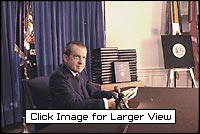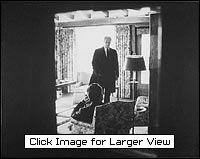|
When Congress reconvened in January 1974, following its Christmas break, the House of Representatives compounded Nixon’s legal troubles. On February 6, it authorized the Judiciary Committee to investigate grounds for the impeachment of President Nixon. This added to investigations already underway by Judge Sirica and the grand jury, Special Prosecutor Jaworski and the Justice Department, and the work done by the Senate select committee on Watergate.
The legal noose tightened on March 1, when the United States District Court for the District of Columbia handed down a thirteen-count indictment against seven former White House aides, including Haldeman, Mitchell, Ehrlichman, and Charles Colson, for hindering its investigations. More damaging politically, Nixon himself was named an “unindicted co-conspirator” by the grand jury.
In April, responding to Jaworski’s demand for more tapes, the White House released edited transcripts. Nixon again appeared on TV to explain his stand against releasing the tapes. While not surprised by Jaworski and the judiciary committee’s insistence on receiving the actual tapes, the public was repulsed by the president’s language in the transcripts. The term “expletive deleted,” replacing coarse swearing, became an oft-repeated phrase in evening news casts and newspaper stories.
|
 |
| ARC #194576 |
 |
 |
 |
| Richard M. Nixon press conference releasing the transcripts of the White House tapes, April 29, 1974 |
 |
| ARC #194467 |
 |
 |
 |
| Richard M. Nixon with H.R. Halderman, October 21, 1972 |
 |
|



